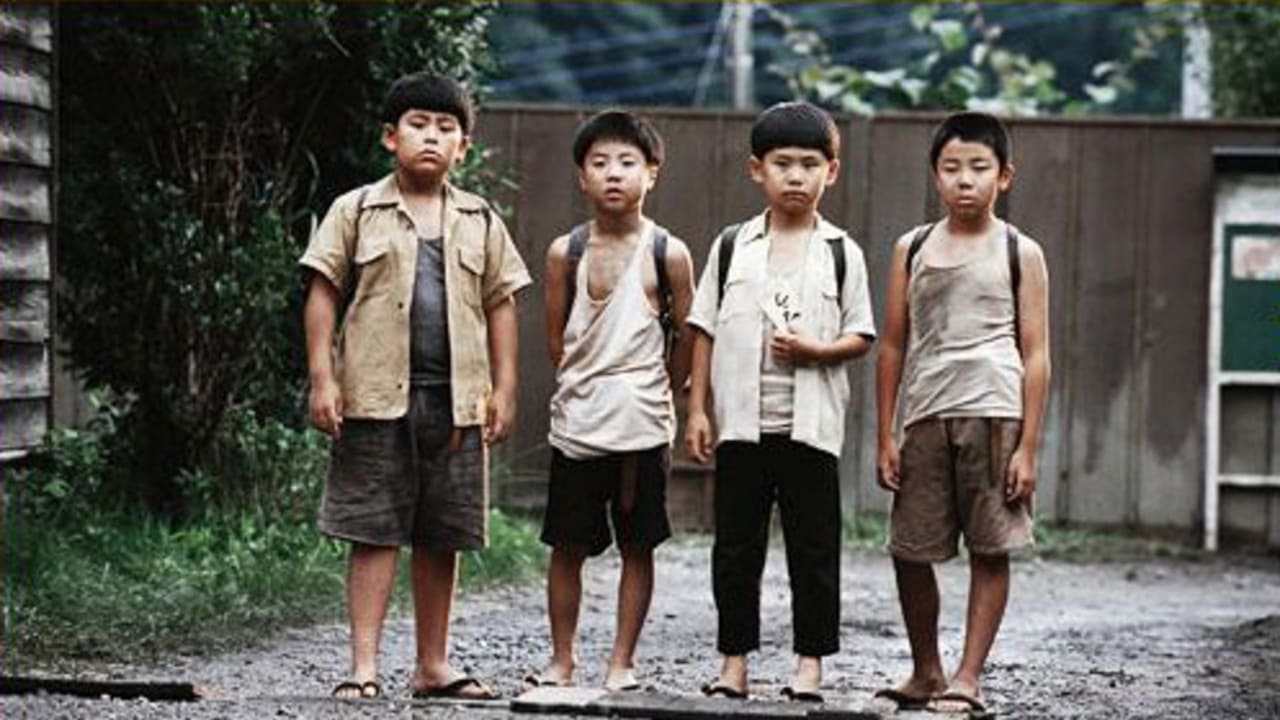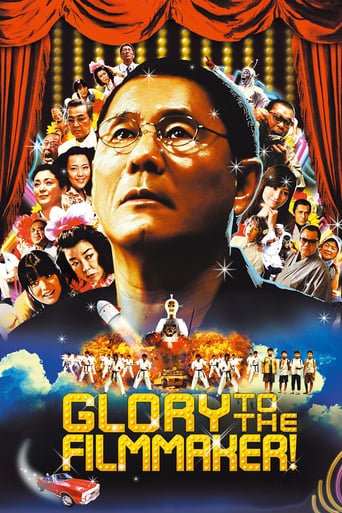

Good start, but then it gets ruined
... View Moredisgusting, overrated, pointless
... View MoreI think this is a new genre that they're all sort of working their way through it and haven't got all the kinks worked out yet but it's a genre that works for me.
... View MoreI enjoyed watching this film and would recommend other to give it a try , (as I am) but this movie, although enjoyable to watch due to the better than average acting fails to add anything new to its storyline that is all too familiar to these types of movies.
... View MoreHow many truly unique films have come out since the year 2000? Not too many. In an age of remakes, rehashes, and parodies, where every film by every director looks exactly the same, it's hard to find an innovative film, especially in the "comedy" genre. Yet once again Kitano delivers in this surreal comedy gem that is unique, deeply personal, affecting on a spiritual level, and is absolutely HILARIOUS.Takeshi's previous film, "Takeshis'" was a surreal compilation of every film Kitano had made prior to it. This film is something of a compilation of all the kinds of films he hasn't made yet. The first half of this film explores that to a hilarious degree, but the second half is when this film really shines. Some of the most off-the-wall, UNREAL humor I've ever seen in a film, specifically a brief animated part near the end that is probably the greatest scene I've ever seen in a film, period.Though for nostalgic reasons, my PERSONAL favorite Kitano films will always be "Hana-Bi" and "Sonatine", I have noticed that Takeshi has actually been getting better and better in recent years (excluding "Zatoichi") as he is starting to explore the more surreal, beautiful, and bizarre moments only hinted at in his first few films. Indeed, like many people, I find Takeshi to be the best director currently working in the world today, and his films are always gems... he's completely tearing apart the very essence of cinema, yet still not jumping into a black hole of impenetrable artiness. "Art for art's sake", maybe, but this is still some brilliant, hilarious stuff, and I'm very happy Takeshi is taking all the money he earns from his acting and personal appearances and pouring them into these brilliant films. The "critics" and Japanese audiences may not care for them, but I'm sure in 10-20 years from now, these films be looked upon as classics of cinema.
... View MoreIf I had to name three directors that had a direct influence on my taste for Japanese movies, Takeshi Kitano would surely be among those three. Films like Hana-bi and Sonatine swept me away into a whole new abyss of film-making. So starting off this film section with a Kitano film is more than appropriate. And what better film to pick than his latest directorial effort, Kantoku: Banzai!. For better or for worse, a movie that at least deserves being written about. Kitano's wacky visions Although in certain ways a complete opposite, Kantoku: Banzai! is the companion piece of Takeshis', Kitano's previous film. When some time ago he announced that he wanted to take a different direction as a director (a quote that is directly referenced in Kantoku: Banzai!), he surely wasn't joking around. He abused Takeshis' to mix up all his previous films into one big Kitano shake. The result was unique. Kantoku: Banzai! fills the void Takeshis' left behind. As a mix of all the films he has never made, the result is even crazier.Kantoku: Banzai! shares the same humor as Takeshis'. Something I'm sure most people will not appreciate. While Kitano's films have always been quite humorous, they still fitted the art-house mold. Apart from Getting Any? of course, but even to the most avid Kitano fans, that film is still relatively unknown. Kantoku: Banzai! sees Kitano going back to Beat Takeshi once more, his character that is most loved in his home country.At the core of this movie, we find Kitano himself. Unable to decide what to make of his new film, he cycles through a series of failed projects, trying his hand at some of the genres he hasn't done before. The parodies on genre films are nice, although still pretty much rooted in the Kitano universe. Things get really weird when his "new" film finally starts. The film turns mad, introducing several crazy characters and delving into the weird kind of slapstick Kitano is known for in his Beat Takeshi role. The doll Kitano has been carrying around finally becomes Kitano himself, showing up whenever it gets rough on the director, taking all the hits.Visually, the film is interesting. Not the knock-out beauty that a film like Dolls was, but much in the same vein as Katsuhito Ishii's Taste of Tea, Kantoku: Banzai! is filled with wacky visuals that defy description. The CGi is quite simplistic, but again this is used to maximum effect. Same goes for the music, which never bears the emotion of Hisaishi's best work, but still conveys and adds to the pleasure of this film.Kantoku: Banzai! is not a perfect film. The structure of the film is quite repetitive (with Kitano trying out many different genres) so in places it does start to drag a little. The humor itself isn't always spot on but within a film like this that is to be expected. But what I missed the most was a scene similar to the end of Takeshis', where Kitano shows off that he can mix art-house with slapstick and still produce a killer result. That kind of grandeur is not really apparent in Kantoku: Banzai! Somehow this is a personal film, as Kitano clearly plays himself, lost in the world of cinema. But it's hard to tell where reality stops and where the film universe takes over. Kitano gloats, he is cocky and pretentious, but just as easily he makes fun of himself. He is one of the few that can actually pull off a film like this. Kantoku: Banzai is one big happy mess of film-making, referencing many other directors, resembling many more, but defying them all by making something totally unique and totally Kitano.We'll see what the future brings. It's not a type of film that Kitano can repeat forever, but together with Takeshis' it marks a mad interruption in his line of work as a director. The film is fun, strange and compelling. It's nice to see many of his regulars pass by (although he should give Terajima a bigger role next time) and through all the wackiness, there's still a whole lot of solid ground in it. If anything, this film will only add to the myth that Takeshi Kitano is.Highly recommended for fans, other people should treat this film with caution. I myself loved it, but I didn't expect anything else.
... View MoreFirstly: I am a big fan of Takeshi Kitano's movies. Except 'Gettin' any!' his movies always delivered and I found myself collecting all the DVDs. Recently I started to wonder what happened to this unique director (sure, directing movies is only part of his artistic portfolio). His movies suddenly seem to take another direction which is more self-reflecting / audience provoking/ . . . - however, not entertaining anymore. Watching his latest one 'Glory to the filmmaker' was simply awful. Where is the story? Where the interesting camera perspectives we fans used to like? They cannot be found. Instead we are left with fragments of different movie genres and no conclusion. I hope Takeshi's self reflecting period will be soon a thing of the past and we will see another outstanding piece of movie as e.g. Hana-Bi.
... View MoreSo.. Kitano has a sense of humor after all! Just kidding. The movie has some points for the general audience but most of it requires some background in history of Japanese cinema, kitano's career, kitano way of life, etc..So if you really want to see everything from Kitano's factory it's OK to watch, if you are really knowledgeable about all that stuff you probably got to watch it, but if you are neither one of them then you'll do fine without even knowing that it exists, although if you watch it (and have the presence of mind of not expecting much of it) then you can have a reasonably good time with it.Kitano is having a hard time accepting he is meant to make movies of a special kind which is not the case of this movie.. He even mentions it in the movie: "I said I wont do another movie with violence and I got to stick to it" Well.. I'm afraid our dear Mr Kitano will have to swallow those words sooner or later, preferably long before he runs out of money.
... View More